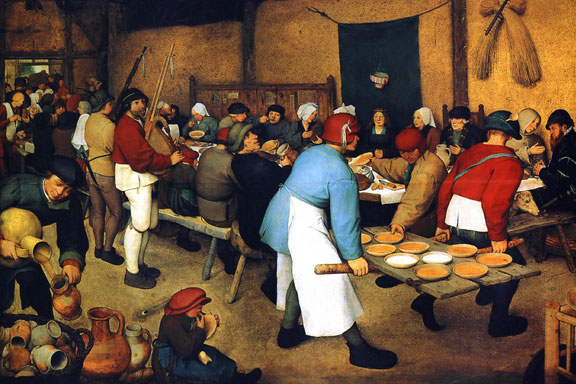The question came up on Tuesday. Online. During the 5:30 Advent Morning Devotion. During the seventh session.
As usual the session began with a short prayer. Then, we began listening to an audio recording of two chapters from the gospel according to Luke.
Within about five minutes, we heard Luke 14:23. It’s in Jesus’ parable of the Great Banquet. The verse reads,
And the master said to the servant, ‘Go out to the highways and hedges and compel people to come in, that my house may be filled.
The reading continued without interruption. After the second chapter was read, we were quiet for 3 minutes of meditation. Then, three people took about a minute each to share promptings they had received.
One person was troubled that in the parable some people were “compelled” to join the banquet.
We had to finish by 6:00 am. There wasn’t time to discuss. So, I’ll address it here.
Here’s a quick summary of the parable (Luke 14:16-24).
A rich man planned a great banquet. He sent invitations to people of high status. People who were rich, well-connected. People who had land, animals, spouses. He gave them early notice. On banquet day, he sent his staff to tell them to come. They didn’t come.
So, the man sent his staff to bring people who were “not blessed.” People who were poor, crippled, blind. People who had no status, couldn’t return favours. People who would only believe the invitation was real if his staff would accompany them to the banquet.
The staff did accompany them. They came.
But there was still space in the banquet for more people.
So, the man sent his staff out again. This time he told them to go outside the city. To people of such low status that they weren’t allowed to live within the city. To people who would only believe the invitation was real if they were sternly ordered to come!
The staff did sternly order them. They came.
“Proper etiquette” in that society was for people of equal status to accept invitations, and for people of lower status to decline such invitations.
Like when I was a child, and my parents took me to visit friends. Before we left home, my mother always warned me that I must refuse any food and drink I was offered. I must only accept if I was “compelled” to accept!
Why did Jesus tell the parable? From the context, we see that he was expanding a demand he had made of people earlier, through another parable: the parable of the wedding feast (Luke 14:7-11). His point was, don’t assume you have a place of honour.
Jesus told the parable of the Great Banquet to teach us to rejoice with those who rejoice. To teach us to include all our neighbours when we celebrate joyous occasions. To NOT discriminate among people on the basis of their looks, health, wealth or ability to return favours.
The parable is part of Jesus’ teaching that kingdom people don’t value status. We value the fact that we were lost and have been found. It’s no accident that Luke speaks next of suffering; of us being society’s salt; of lost and found sheep, a lost and found coin, and a lost and found son.
The parable made me recall three bible teachings:
John 13:34
A new commandment I give to you, that you love one another: just as I have loved you, you also are to love one another.
Romans 12:15,
Rejoice with those who rejoice, weep with those who weep.
James 2:1-4,
… show no partiality as you hold the faith in our Lord Jesus Christ, the Lord of glory. For if a man wearing a gold ring and fine clothing comeornto your assembly, and a poor man in shabby clothing also comes in, and if you pay attention to the one who wears the fine clothing and say, “You sit here in a good place,” while you say to the poor man, “You stand over there,” or “Sit down at my feet,” have you not then made distinctions among yourselves and become judges with evil thoughts?
Does God compel people to enter the kingdom?
In a way, yes. We sense how holy, unlike us, God is. We know our own hearts. We simply cannot believe that God could ever seek our company. But we hear the stories Jesus told. We hear the longings and predictions of the prophets. We hear fresh stories about Jesus, Christians, churches.
We know we were lost. We know we’ve been found.
The parable’s message is for the elites: “none of those men who were invited shall taste my banquet.” They shut the door on themselves.
Peace be with you.
To learn more about Rama, click here.


